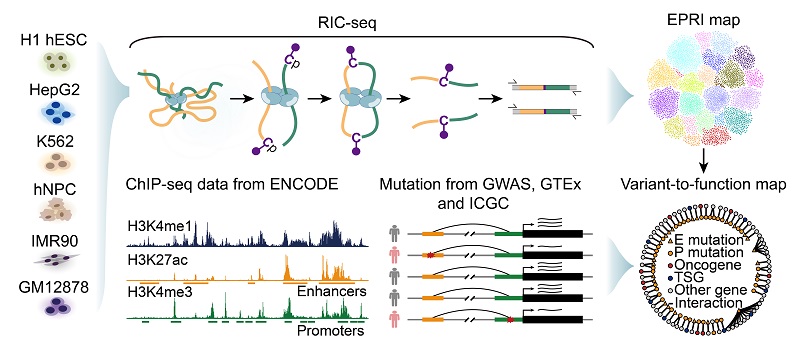Complementary Alu sequences mediate enhancer-promoter selectivity
Enhancers and promoters orchestrate the spatiotemporal expression of genes through long-range chromatin pairing and looping, yet the enhancer-promoter pairing specificity has remained elusive.
In addition, approximately 90% of the disease-associated variants reside at enhancers and promoters in various cancers. Interpreting the molecular functions of those risk variants has proved challenging, and accurately assigning them to the enhancer-promoter connectivity networks could help accomplish the goal.
In a study published in Nature, Xue Yuanchao's team from the Institute of Biophysics, Chinese Academy of Sciences constructed the high-resolution enhancer-promoter RNA interaction (EPRI) maps by employing their developed RIC-seq technique, which has been proven powerful in capturing pairwise interacting enhancer RNAs and promoter-derived noncoding RNAs.
Intriguingly, they unveiled that Alu (the most prominent repeats in the human genome) sequences within enhancer and promoter RNAs act as mediators of enhancer-promoter communication. Moreover, they provided considerable evidence demonstrating that Alu complementary sequences could form RNA duplexes to dictate enhancer-promoter selectivity. This discovery sheds new light on how enhancers communicate with promoters to activate transcription.
Based on EPRI maps, they further created several "variant-to-function" maps to systematically annotate the molecular function of non-coding mutations, with particular emphasis on Alu deletions and insertions. These maps offer valuable insights into the potential mechanisms underpinning tumorigenesis.
"Our study uncovers a principle for determining enhancer-promoter pairing specificity and provides a framework to link noncoding risk variants to their molecular functions," said Prof. Xue.

Figure. EPRI (Enhancer-promoter RNA interaction) map and variant-to-function map construction
Article link: https://www.nature.com/articles/s41586-023-06323-x
Contact: XUE Yuanchao
Institute of Biophysics, Chinese Academy of Sciences
Beijing 100101, China
Email: ycxue@ibp.ac.cn
(Reported by Prof. XUE Yuanchao's group)

